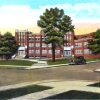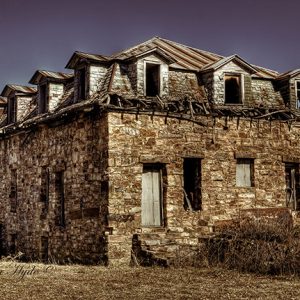calsfoundation@cals.org
Mountain Crest Academy
Mountain Crest Academy was located seven miles south of Combs (Madison County), just one mile from the Madison County line. The academy was one of a large number of schools founded by the Presbyterian Church to serve the “backward classes” of the rural mountain South. The church became interested in this home mission work around 1910 and established a large number of such schools, many of them in the Appalachian Mountains. By 1917, the Southern branch of the Presbyterian Church (the Presbyterian Church in the United States, or PCUS) was supporting forty-two such schools, which served more than 2,000 students. Some of the schools also emphasized local mountain crafts.
Mountain Crest was apparently the brainchild of the Reverend John W. Jeter, who started his work as a supply pastor and missionary in Combs in 1916. For the first few years, his wife taught the school in a cabin, and later in their home, while he raised money to support the effort. By 1920, he was able to join her, becoming head of the academy.
The campus eventually included two buildings. The first was a two-story stone building that had classrooms on the first floor and a library and dormitory for the boys on the second floor. The second building, located across the road, was a frame dormitory for girls. Mountain Crest was the only school in the area that offered twelve grades. Tuition was $1.00 per month, and poorer students could work to defray part of their tuition costs. Most of the school’s students came from Franklin, Madison, and Crawford counties. While Mountain Crest did not have a primary focus on local crafts, it did have a rug-weaving program, supported by the Daughters of the American Revolution, during the 1920s.
John Jeter left the academy in 1925 to become a domestic missionary in Fayetteville (Washington County); by 1928, he had left the Presbyterian Church altogether. He was succeeded by the Reverend Holly Hunter Patrick, who was to remain the school’s superintendent until it closed in 1931. While the Depression undoubtedly contributed to the closing of the academy, it was probably also a result of the 1931 decision of the General Assembly of the PCUS not to continue supporting mission schools where there were adequate state schools, or where they did not provide forms of training “which are not provided by the state, and which are necessary to the permanence and progress of the Church in the region served.”
The Synod of Arkansas sold the Mountain Crest property to a Reverend Hamby of the Pentecostal Church in 1943, donating the proceeds to Arkansas College (now Lyon College) in Batesville (Independence County) to provide scholarships for students from the Ozark Mountains. The buildings were used for summer camp meetings for several years before they were sold to a local farmer. The stone classroom building was still standing in 2009 and was being used as a farm building.
For additional information:
Blevins, Brooks. “Mountain Mission Schools in Arkansas.” Arkansas Historical Quarterly 70 (Winter 2011): 398–428.
“The Mountaincrest Academy” and “Mountaincrest Academy.” Madison County Musings 28 (Summer 2009): 80.
Nancy Snell Griffith
Presbyterian College
 Education, Elementary and Secondary
Education, Elementary and Secondary Mountain Mission Schools
Mountain Mission Schools Mountain Crest Academy Building
Mountain Crest Academy Building 




The Reverend John Ernest Jeter (not John “W” as is stated some places) was my grandfather. He was serving as a missionary with the American Sunday School Union in northwest Arkansas when he and his wife, Callie (King) Jeter, were touched by the need for educating the children in this mountain area. They founded the Mountaincrest Academy with help from the Arkansas synod of the Presbyterian (South) Church and supplemented operating costs with donations that John Jeter received from churches and individuals while serving the area as a circuit-riding preacher. Callie Jeter held a degree from Arkansas College (now Lyon College) in Batesville and had years of teaching experience. Her part in the founding of the school cannot be overstated. The Jeters served in pastoral and evangelistic ministry after leaving Mountaincrest, eventually helping Dr. P. C. Nelson establish Southwestern Bible School in Enid, Oklahoma, in 1927 (now Southwestern Assemblies of God University, Waxahachie, Texas).